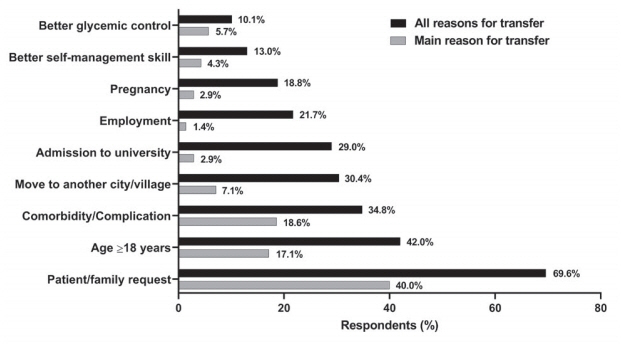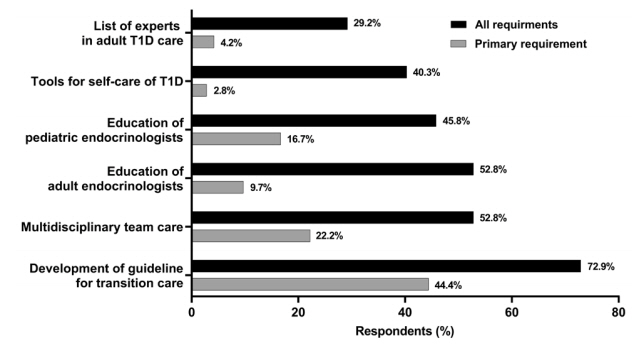Ann Pediatr Endocrinol Metab.
2021 Jun;26(2):112-117. 10.6065/apem.2040194.097.
A national survey of transition from pediatric to adult healthcare providers for adolescents and young adults with type 1 diabetes: perspectives of pediatric endocrinologists in Korea
- Affiliations
-
- 1Department of Pediatrics, Seoul National University Bundang Hospital, Seongnam, Korea
- 2Department of Pediatrics, Seoul National University College of Medicine, Seoul, Korea
- 3Department of Pediatrics, Dong-A University College of Medicine, Busan, Korea
- KMID: 2517589
- DOI: http://doi.org/10.6065/apem.2040194.097
Abstract
- Purpose
Transition from pediatric to adult healthcare for adolescents and young adults with type 1 diabetes (T1D) increases the risk for poor outcomes. This study aimed to describe the circumstances and clinical practice patterns associated with this transition of care based on a nationwide survey of pediatric endocrinologists in Korea.
Methods
An electronic survey regarding the healthcare transition of T1D patients was administered to 143 pediatric endocrinologists registered in the Korean Society of Pediatric Endocrinology.
Results
The response rate was 50.2% (n=72). Among responders, 58.3% (n=42) were females, and 70.8% (n=51) worked in academic medical centers. The main reasons for transfer to adult care were request from a patient or family (69.6%) and age ≥18 years (42.0%). Impediments to transition were a long-lasting therapeutic relationship (72.9%) and lack of adult specialists in T1D care (62.9%). Communication between pediatric and adult endocrinologists was via nonstructured patient summary (68.6%) and telephone or email (27.1%). Responders reported that successful transition requires development of transition protocols (79.2%) and a multidisciplinary team approach for transition care (52.8%).
Conclusion
Transition care of T1D patients is a challenge to pediatric endocrinologists in Korea. Development of transition care protocols for healthcare providers and improvement of diabetes self-management skills for patients are needed.
Figure
Cited by 1 articles
-
Diabetes in Adolescence, Appropriate Transition to Adult Clinic
Jieun Lee, Jae Hyun Kim
J Korean Diabetes. 2021;22(2):77-84. doi: 10.4093/jkd.2021.22.2.77.
Reference
-
References
1. DiMeglio LA, Evans-Molina C, Oram RA. Type 1 diabetes. Lancet. 2018; 391:2449–62.
Article2. Diaz-Valencia PA, Bougneres P, Valleron AJ. Global epidemiology of type 1 diabetes in young adults and adults: a systematic review. BMC Public Health. 2015; 15:255.
Article3. Chiang JL, Maahs DM, Garvey KC, Hood KK, Laffel LM, Weinzimer SA, et al. Type 1 diabetes in children and adolescents: a position statement by the American Diabetes Association. Diabetes Care. 2018; 41:2026–44.4. Chiang JL, Kirkman MS, Laffel LM, Peters AL; Type 1 Diabetes Sourcebook A. Type 1 diabetes through the life span: a position statement of the American Diabetes Association. Diabetes Care. 2014; 37:2034–54.
Article5. Arnett JJ. Emerging adulthood. A theory of development from the late teens through the twenties. Am Psychol. 2000; 55:469–80.
Article6. Kipps S, Bahu T, Ong K, Ackland FM, Brown RS, Fox CT, et al. Current methods of transfer of young people with type 1 diabetes to adult services. Diabet Med. 2002; 19:649–54.
Article7. Bryden KS, Dunger DB, Mayou RA, Peveler RC, Neil HA. Poor prognosis of young adults with type 1 diabetes: a longitudinal study. Diabetes Care. 2003; 26:1052–7.8. Busse FP, Hiermann P, Galler A, Stumvoll M, Wiessner T, Kiess W, et al. Evaluation of patients' opinion and metabolic control after transfer of young adults with type 1 diabetes from a pediatric diabetes clinic to adult care. Horm Res. 2007; 67:132–8.
Article9. Weissberg-Benchell J, Wolpert H, Anderson BJ. Transitioning from pediatric to adult care: a new approach to the postadolescent young person with type 1 diabetes. Diabetes Care. 2007; 30:2441–6.10. Laing SP, Jones ME, Swerdlow AJ, Burden AC, Gatling W. Psychosocial and socioeconomic risk factors for premature death in young people with type 1 diabetes. Diabetes Care. 2005; 28:1618–23.
Article11. Peters A, Laffel L; American Diabetes Association Transitions Working Group. Diabetes care for emerging adults: recommendations for transition from pediatric to adult diabetes care systems: a position statement of the American Diabetes Association, with representation by the American College of Osteopathic Family Physicians, the American Academy of Pediatrics, the American Association of Clinical Endocrinologists, the American Osteopathic Association, the C enters for Disease Control and Prevention, Children with Diabetes, The Endocrine Society, the International Society for Pediatric and Adolescent Diabetes, Juvenile Diabetes Research Foundation International, the National Diabetes Education Program, and the Pediatric Endocrine Society (formerly Lawson Wilkins Pediatric Endocrine Society). Diabetes Care. 2011; 34:2477–85.12. American Academy of Pediatrics; American Academy of Family Physicians; American College of Physicians; Transitions Clinical Report Authoring Group, Cooley WC, Sagerman PJ. Supporting the health care transition from adolescence to adulthood in the medical home. Pediatrics. 2011; 128:182–200.
Article13. Cameron FJ, Garvey K, Hood KK, Acerini CL, Codner E. ISPAD Clinical Practice Consensus Guidelines 2018: diabetes in adolescence. Pediatr Diabetes. 2018; 19 Suppl 27:250–61.
Article14. American Diabetes Association. 13. Children and adolescents: standards of medical care in diabetes-2020. Diabetes Care. 2020; 43:S163–82.15. Lee YA. Diabetes care for emerging adults: transition from pediatric to adult diabetes care systems. Ann Pediatr Endocrinol Metab. 2013; 18:106–10.
Article16. The Endocrine Society. Transition of care, type 1 diabetes [Internet]. Washington, DC: Endocrine Society;2021. [cited 2020 May 1]. Available from: https://www.endocrine.org/improving-practice/patient-resources/transitions/t1d.17. Garvey KC, Beste MG, Luff D, Atakov-Castillo A, Wolpert HA, Ritholz MD. Experiences of health care transition voiced by young adults with type 1 diabetes: a qualitative study. Adolesc Health Med Ther. 2014; 5:191–8.
Article18. Kellett J, Sampson M, Swords F, Murphy HR, Clark A, Howe A, et al. Young people's experiences of managing type 1 diabetes at university: a national study of UK university students. Diabet Med. 2018; 35:1063–71.19. Fisher E, Lazar L, Shalitin S, Yackobovitch-Gavan M, de Vries L, Oron T, et al. Association between glycemic control and clinic attendance in emerging adults with type 1 diabetes: a tertiary center experience. J Diabetes Res. 2018; 2018:9572817.
Article20. Garvey KC, Foster NC, Agarwal S, DiMeglio LA, Anderson BJ, Corathers SD, et al. Health care transition preparation and experiences in a U.S. National Sample of young adults with type 1 diabetes. Diabetes Care. 2017; 40:317–24.
Article21. Lyons SK, Helgeson VS, Witchel SF, Becker DJ, Korytkowski MT. Physicians' self-perceptions of care for emerging adults with type 1 diabetes. Endocr Pract. 2015; 21:903–9.
Article22. Garvey KC, Telo GH, Needleman JS, Forbes P, Finkelstein JA, Laffel LM. Health care transition in young adults with type 1 diabetes: perspectives of adult endocrinologists in the U.S. Diabetes Care. 2016; 39:190–7.
Article23. de Beaufort C, Jarosz-Chobot P, Frank M, de Bart J, Deja G. Transition from pediatric to adult diabetes care: smooth or slippery? Pediatr Diabetes. 2010; 11:24–7.
Article24. Agar wal S, Gar vey KC, R aymond JK, Schutta MH. Perspectives on care for young adults with type 1 diabetes transitioning from pediatric to adult health systems: a national survey of pediatric endocrinologists. Pediatr Diabetes. 2017; 18:524–31.
Article25. Kim G, Choi EK, Kim HS, Kim H, Kim HS. Healthcare transition readiness, family support, and self-management competency in Korean emerging adults with type 1 diabetes mellitus. J Pediatr Nurs. 2019; 48:e1–7.
Article26. Lee JH, Kim YM, Kwak MJ, Kim SY, Kim HJ, Cheon CK, et al. Incidence trends and associated factors of diabetes mellitus in Korean children and adolescents: a retrospective cohort study in Busan and Gyeongnam. Ann Pediatr Endocrinol Metab. 2015; 20:206–12.
Article27. Kim JH, Lee CG, Lee YA, Yang SW, Shin CH. Increasing incidence of type 1 diabetes among Korean children and adolescents: analysis of data from a nationwide registry in Korea. Pediatr Diabetes. 2016; 17:519–24.
Article28. Garvey KC, Wolpert HA, Laffel LM, Rhodes ET, Wolfsdorf JI, Finkelstein JA. Health care transition in young adults with type 1 diabetes: barriers to timely establishment of adult diabetes care. Endocr Pract. 2013; 19:946–52.
Article29. Blum RW, Garell D, Hodgman CH, Jorissen TW, Okinow NA, Orr DP, et al. Transition from child-centered to adult health-care systems for adolescents with chronic conditions. A position paper of the Society for Adolescent Medicine. J Adolesc Health. 1993; 14:570–6.30. Vloemans AF, Eilander MMA, Rotteveel J, Bakker-van Waarde WM, Houdijk E, Nuboer R, et al. Youth with type 1 diabetes taking responsibility for self-management: the importance of executive functioning in achieving glycemic control: results from the longitudinal DINO study. Diabetes Care. 2019; 42:225–31.31. White M, O'Connell MA, Cameron FJ. Clinic attendance and disengagement of young adults with type 1 diabetes after transition of care from paediatric to adult services (TrACeD): a randomised, open-label, controlled trial. Lancet Child Adolesc Health. 2017; 1:274–83.
Article32. Spaic T, Robinson T, Goldbloom E, Gallego P, Hramiak I, Lawson ML, et al. Closing the gap: results of the multicenter Canadian randomized controlled trial of structured transition in young adults with type 1 diabetes. Diabetes Care. 2019; 42:1018–26.
Article
- Full Text Links
- Actions
-
Cited
- CITED
-
- Close
- Share
- Similar articles
-
- Diabetes in Adolescence, Appropriate Transition to Adult Clinic
- Management of Type 2 Diabetes Mellitus in Adolescents and Young Adults
- Management issues of congenital adrenal hyperplasia during the transition from pediatric to adult care
- Diabetes care for emerging adults: transition from pediatric to adult diabetes care systems
- How Can We Do Transition Successfully from Pediatric to Adult Clinics in Inflammatory Bowel Disease?




